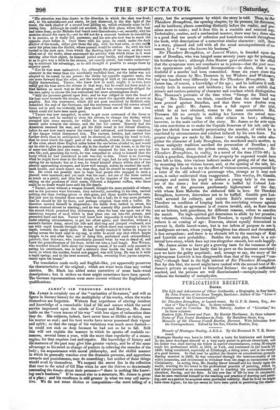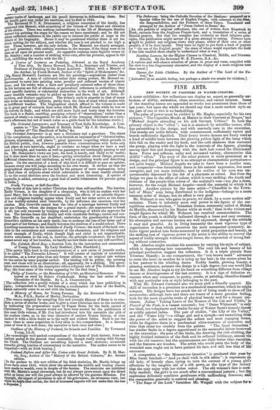PUBLICATIONS RECEIVED.
BOORS.
The Life and Adventures of Oliver Goldsmith; a Biography, in four books. By John Forster, of the loner Temple, Barrister; Author of the " Lives of Statesmen of the Commonwealth."
Sir Theodore Broughton, or Laurel-water. By G. P. R. James, Esq., Au- thor of " The Convict,: &c. In three volumes. Fashion and its Votanes. By Mrs. Maberly, Anther of " Leontine," &c. In three volumes.
Eastern Life, Present and Past. By Harriet Martineau. In three volumes. Notes of Two Years' Residence in Italy. By Hamilton Geol._ ,e Memoirs of Sir Thomas Fowell Buxton, Baronet. With Selections from his Correspondence. Edited by his Son, Charles Buxton, Esq.
Memoir of Montague Stanley, A.R.S.A. By the Reverend D. T. K. Drum- mond.
[Montague Stanley was born in 1809, with a taste for histrionics and drawing. As the actor develop.d himself at a very early period in private theatricals, and his father was dead leaving his widow in narrow circumstances, young Montague made his professional debut in 1824, at York, and continued on the boards till 1838; being considered, especially at Edinburgh, a rising actor, and in the receipt of a good income. In that year he quitted the theatre on conscientious grounds. Having married in 1888, he was converted through the instrumentality of his wife's connexion, and determined to withdraw from the stage as inconsistent with Christianity. In acting thus, Mr. Stanley threw himself and his family upon the world; trusting for his bread to the professional practice of painting, which he had always pursued as an amusement, and to teaching the accomplishments of elocution, fencing, and the flute. In this new line of life he was so successful, that he soon restricted himself to the teaching and practice of drawing and paint- ing; and as &painter he acquired some provincial celebrity. Had he lived he might have risen higher; for his eye seems to have been quick in perceiving the charac-
turistic traits of landscape, and his pencil dexterous in delineating them. But his health gave way under his exertions, and he died in 1844.
The Reverend D. T. K. Drummond, a religious connexion of the family, has composed this Memoir, with something of the falness of the friend and elevation of the divine. There was nothing extraordinary in the life of Montague Stanley beyond his quitting the stage for the reason we hare mentioned; and he did not attain sufficient eminence in the public eye to interest the public at large in the details of his biography. Hence it may be questioned whether there is not too much writing for the subject, and whether the tone is not pitched in too high a key. These, however, are the only defects. The Memoirs are clearly arranged, and well presented; with nothing overdone in the manner, if the thing were to be done at all upon its present scale. An appendix contains some fugitive verses by Mr. Stanley; and a number of striking wood-cuts, after his pictures, appear in the book, exhibiting the works with the life.]
A Course of Lectures on Painting, delivered at the Royal Academy of Fine Arts. By Henry Howard, Esq., RA., Secretary and Trustee, and Professor of Painting to the Royal Academy. Edited, with a Memoir of the Author, by Frank Howard, Author of the " Spirit of Shakespeare," &c. Henry Howard's Lectures are like his paintings—aspirations rather than
ormances. A man of cultivated rather than strong powers, Mr. Howard en- eavoured to carry into painting some peculiar and softened version of classic ideas; and his works were a faint and peculiarly coloured reflex of those ideas. So his lectures are fall of allusions or generalized references to authorities; they want specific doctrine or substantial instruction in the work of art. Although many sensible remarks may be picked up here and there, they fail in force, di- rectness, and distinct application. The writer's style is superior to that of many who write on technical subjects, partly from the turn of mind which makes him an indifferent teacher. The biographical sketch affixed to the volume is made up in great part of extracts from notes which Mr. Howard made while he was on his travels in Italy, and which are still more light and hasty than the lectures. The book is a fluent, rambling, gossiping volume of "observations," rather than a manual of study—a companion for the sofa of the lounging dilettante on a sum- mer's afternoon, but not of much value as a guide-book for the laborious studio.]
The Oriental Interpreter, and Treasury of East India Knowledge, A Com- panion to "The Handbook of British India." By J. H. Stocqueler, Esq., Author of" The Handbook of India," Rec. [The Oriental Interpreter is at once a dictionary and a gazetteer. The object of the compilation, says the author, is to furnish an explanation of " Oriental terms, phrases, expressions, and places "; great ignorance respecting which prevails in the British public, that, however passable when communication with India only took place at rare intervals, ought to continue no longer when we have a mail once a fortnight, and tourists as well as passengers are continually passing to and fro. Mr. Stocqueler's views are just; his book is handy, and likely to be useful; but it does more than he says it does,—giving information about things, persons, historical characters, and institutions, as well as explaining words and describing places. On the execution of a book of this kind it is difficult to pass an opinion, because every one will judge according to his own wants. It strikes us that the geographical descriptions are too full for the purpose of mere explanation, being of that class of subjects about which information is the most readily obtained. To us the social sketches seem the freshest and most interesting. A species of appendix is added, containing a good deal of useful information for persons going to India.] Emily Vernon; or Self-Sacrifice.
[The moral of this tale is rather Christian duty than self-sacrifice. The heroine, Emily Vernon, is the daughter of a clergyman, who is left an orphan with her sister Mary, but in competent circumstances. The effects of an amiable disposi- tion and religious training appear when Emily and her sister arrive at the house of her worldly-minded aunt Grenville, by the influence she exercises over her cousins. Mrs. Grenville cannot bear the idea, of a marriage between Emily and her son Charles, whom she designs for a grand match: she manoeuvres to break it off; but only succeeds by bringing about a marriage of which she approves far less. The heroine bears this firmly and with charitable feelings; nurses and con- verts Mrs. Grenville on her deathbed; undertakes thepof Charles Grenville's children on his early death; has to undergo the loss of her sister and of great part of her fortune; • and finally becomes the mistress of a model school. There is nothing uncommon in the incidents of Emily Vernon: the merit of the book con- sists in the naturalness and consistency of the characters, and the religious and moral example of Emily, which though high and strict is not impracticable. Active submission to the end, is, however, the principle inculcated; for as Emily cannot avoid any of her troubles, we hardly see how there can be any self-sacrifice.]]
The Eskdale Herd-Boy; a Scottish Tale, for the instruction and amusement of Young Persons. By Lady Stoddart, (Mrs. Blackford.) [This pretty little book is the commencement of a new series of juvenile works, to be called The Favourite Library." It will consist of reprints of established favourites, at a lower price than any former edition, or an original tale written for the series by some popular. author. The binding will be pretty, the printing neat, and there will be an illustration; all, apparently, for a shilling. The specu- lation commences with the descriptive ethico-religious tale of The Eskdale Herd- Boy; the true name of the writer appearing for the first time.] Philip of Lutetia, or the Revolution of 1789; an Historical Romance. illus- trated on steel by Robert Cruikshank. Being the last series of the Chronicles of the Bastile. By L. A. Chamerovzow.
[The collection into a goodly volume of a story which has been publishing in parts; independent in itself, but forming a continuation of tales of the Bastile, which naturally come to an end with the fortress.]
A History of Rome, for Young Persons. By the Reverend Samuel Fox, M.A., F.S.A., Rector of Morley, Derbyshire.
The reason assigned for compiling this new juvenile History of Rome is to com- plete a series of similar books, and to give a more Christian tura to the narrative, by indicating the preparations made by Pagan Rome for the facile spread of Christianity. These reasons would not have been needed for the publication of this neat little volume, if Mr. Fox had introduced into his narrative the pith of the modern views as to the true character of ancient Roman history, or even dashed it with a little doubt as to the early and evident fables. Such is not the case: there is more scepticism in Livy than in this compendium. In a literary point of view it is well done; the narrative is both clear and close.]
Outlines of the History of Ireland, for Schools and Families. By Townsend Young, LL.D [An exceedingly well-packed compendium of the facts of Irish history, from the earliest period to the present time nominally, though really closing with George the Third. The Outlines are something beyond a mere skeleton; occasional remarks giving touches of commentary to the narrative. The author seems to be impartial—with an Irish leaning.]
Ireland Before and After the Union with Great Britain. By R. M. Mar- tin, Esq., Author of the " History of the British Colonies," &c. Second edition.
[In the preface to this new edition of his Irish statistics, Mr. Martin brings up those facts since 1843, which show the advances the middle and trading classes have made in wealth, even in despite of the famine. The statistics are exhibited with Mr. Martin's usual cleverness, but do not always prove much upon the direct point at issue, nor will the proof always be allowed by the genuine Milesian. For example, the export of provisions is one of his grievances: an erroneous view, but while he holds that notion, the fact of increased exports will not make him the less a Repealer.]
Via Dolorosa,- being the Catholic Devotion of the Stations: prepared as a Special Office for the use of English People, with reference to the Sins, the Responsibilities, and the Portents of these Times. Translated and arranged by the Author of " From Oxford to Rome," &C. [An oils podrida of original reflections, bits out of writers from Klopstock to Hook, extracts from the Anglican Prayer-book, and a translation of a series of Romish prayers. But that the compiler has evidently no fixed religious prin- ciples, this publication might savour of a pions attempt to entrap. Persons have re right to publish any religious views they please, either of their own or other people's, if it be done openly. They have no right to put forth a book of prayers for " the use of the English people,' the mass of whom would repudiate the book if the title enabled them clearly to understand what it was.] Reading Lessons, for the Higher Classes in Classical, Middle, and Diocesan Schools. By the Reverend W. B. Flowers, B.A., &c. [A various and well-chosen selection of pieces in prose and verse, compiled with the view to a less fragmentary character, and the display of a more religious tone than usual.] Hymns for Little Children. By the Anther of "The Lord of the Fo- rest," &c.
[Animated by an amiable feeling, but perhaps a shade too ornate fur children.]



























 Previous page
Previous page